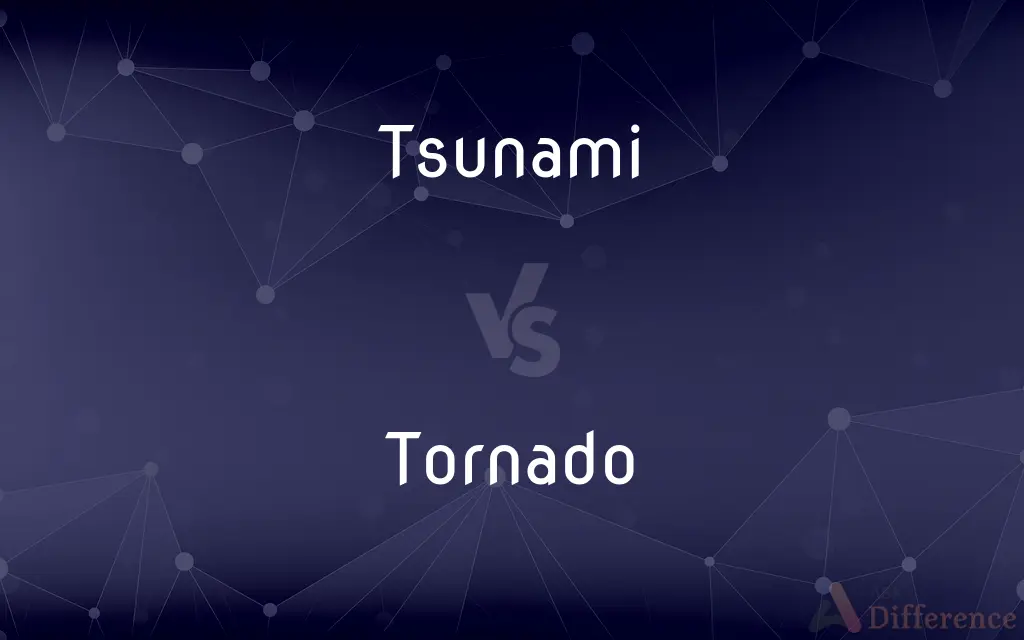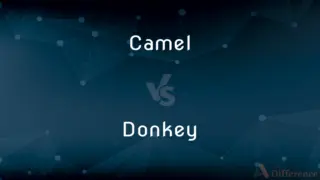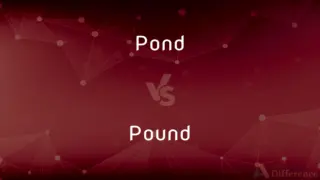Tsunami vs. Tornado — What's the Difference?
By Fiza Rafique & Maham Liaqat — Updated on March 7, 2024
A tsunami is a series of ocean waves caused by underwater disturbances, while a tornado is a violent rotating column of air extending from a thunderstorm to the ground.

Difference Between Tsunami and Tornado
Table of Contents
ADVERTISEMENT
Key Differences
Tsunamis are typically triggered by underwater earthquakes, volcanic eruptions, or landslides, leading to a rapid displacement of water. This displacement generates a series of waves that can travel across entire ocean basins, striking coastal areas with little warning and causing widespread flooding. In contrast, tornadoes form in severe thunderstorms, often associated with supercells, where differences in wind speed and direction at different altitudes create a rotating effect, eventually leading to the formation of a tornado if conditions are right.
The scale and impact of tsunamis and tornadoes differ significantly. Tsunamis can affect large stretches of coastline, potentially impacting multiple countries or entire islands with a single event. Tornadoes, however, typically have a more localized impact, affecting relatively small areas but with intense and concentrated destruction. The Fujita Scale (F-Scale) measures tornado intensity based on damage caused, ranging from F0 (weakest) to F5 (most intense), while tsunamis do not have a similar scale due to their different nature and impact mechanisms.
Warning systems for both phenomena have evolved, with tsunami warning centers monitoring seismic activity and ocean conditions to provide alerts, whereas tornado warnings are issued based on meteorological observations and radar data indicating severe storm conditions conducive to tornado formation.
Both tsunamis and tornadoes pose significant natural hazards but require different preparedness and response strategies due to their distinct characteristics, causes, and areas of impact.
Comparison Chart
Cause
Underwater disturbances like earthquakes or landslides.
Severe thunderstorms, often with supercells.
ADVERTISEMENT
Nature
Series of ocean waves.
Rotating column of air.
Scale of Impact
Can affect entire coastlines and multiple countries.
Typically localized, affecting small areas intensely.
Warning Systems
Based on seismic and ocean data.
Based on meteorological observations and radar.
Intensity Scale
No specific scale; described by wave height and speed.
Fujita Scale (F0-F5) based on damage.
Compare with Definitions
Tsunami
Can travel across entire ocean basins, with waves reaching thousands of miles from the source.
The tsunami waves generated in the Pacific Ocean were detected on distant shores hours later.
Tornado
A violent rotating column of air extending from a thunderstorm to the ground.
The tornado tore through the countryside, leaving a path of destruction in its wake.
Tsunami
Tsunami warning systems monitor for seismic activity indicative of potential tsunamis.
The regional tsunami warning center issued alerts following the significant underwater quake.
Tornado
Formed in severe thunderstorms and can be preceded by hail and intense wind.
The severe thunderstorm spawned multiple tornadoes, causing emergency alerts across the region.
Tsunami
A series of large ocean waves caused by significant disturbances beneath the water's surface.
The underwater earthquake triggered a devastating tsunami that hit multiple coastal communities.
Tornado
The intensity and path of tornadoes can be unpredictable, making them particularly dangerous.
The tornado changed direction suddenly, catching many residents off guard.
Tsunami
Coastal areas are particularly vulnerable to tsunamis, which can lead to extensive flooding and damage.
The coastal village was completely inundated by the tsunami, causing widespread destruction.
Tornado
Tornado warnings are issued based on specific radar signatures and storm spotter reports.
Meteorologists issued a tornado warning after spotting a funnel cloud on the radar.
Tsunami
Tsunamis emphasize the need for coastal communities to have evacuation plans and safe zones.
Following the tsunami warning, residents evacuated to predetermined safe zones.
Tornado
Tornadoes require immediate action to seek shelter, often in a basement or a small, windowless interior room.
As the tornado siren sounded, families rushed to their storm shelters for safety.
Tsunami
A tsunami ( (t)soo-NAH-mee, (t)suu-; from Japanese: 津波, lit. 'harbour wave', pronounced [tsɯnami]) is a series of waves in a water body caused by the displacement of a large volume of water, generally in an ocean or a large lake. Earthquakes, volcanic eruptions and other underwater explosions (including detonations, landslides, glacier calvings, meteorite impacts and other disturbances) above or below water all have the potential to generate a tsunami.
Tornado
A tornado is a violently rotating column of air that is in contact with both the surface of the Earth and a cumulonimbus cloud or, in rare cases, the base of a cumulus cloud. The windstorm is often referred to as a twister, whirlwind or cyclone, although the word cyclone is used in meteorology to name a weather system with a low-pressure area in the center around which, from an observer looking down toward the surface of the earth, winds blow counterclockwise in the Northern Hemisphere and clockwise in the Southern.
Tsunami
A long, high sea wave caused by an earthquake or other disturbance
The loss of human lives from this latest tsunami is staggering
Tornado
A violently rotating column of air extending from a cumulonimbus cloud to the ground, ranging in width from a few meters to more than a kilometer, with destructive winds up to 510 kilometers (316 miles) per hour or higher. Tornadoes are typically associated with a funnel cloud pendant from a storm's wall cloud, often extending to the bottom of the tornado.
Tsunami
A very large ocean wave caused by an underwater earthquake or volcanic eruption.
Tornado
A violent thunderstorm in western Africa or nearby Atlantic waters.
Tsunami
A very large and destructive wave, generally caused by a tremendous disturbance in the ocean, such as an undersea earthquake or volcanic eruption. Tsunami are usually a series of waves, or wave train.
Tornado
A whirlwind or hurricane.
Tsunami
(figurative) A large and generally unstoppable surge.
Tornado
(meteorology) A violent windstorm characterized by a mobile, twisting, funnel-shaped cloud.
A tornado is a rotating column of air.
Tsunami
A huge destructive wave (especially one caused by an earthquake)
Tornado
A violent whirling wind; specifically (Meteorol.), a tempest distinguished by a rapid whirling and slow progressive motion, usually accompaned with severe thunder, lightning, and torrents of rain, and commonly of short duration and small breadth; a small cyclone.
Tornado
A localized and violently destructive windstorm occurring over land characterized by a funnel-shaped cloud extending toward the ground
Tornado
A purified and potent form of cocaine that is smoked rather than snorted
Common Curiosities
Are tornadoes only found in the United States?
While the U.S. experiences the most tornadoes, they can occur almost anywhere in the world under the right conditions.
What is the safest place during a tornado?
The safest place during a tornado is an underground shelter, basement, or an interior room on the lowest floor, away from windows and exterior walls.
Can tsunamis occur in any ocean?
Yes, tsunamis can occur in any ocean or large body of water if there's a sufficient underwater disturbance.
How long do tsunamis and tornadoes last?
Tsunami events can last for several hours as multiple waves hit the shore, while tornadoes are typically much shorter, often lasting just a few minutes.
How fast can a tsunami travel?
Tsunamis can travel across the ocean at speeds up to 500 miles per hour (800 kilometers per hour), similar to the speed of a jet plane.
How do tsunami warning systems work?
Tsunami warning systems use seismic data to detect earthquakes and sea level monitoring stations to measure changes in ocean levels that indicate a tsunami has been generated.
How can coastal communities prepare for tsunamis?
Coastal communities can prepare by establishing tsunami warning systems, evacuation routes, and education programs about tsunami safety.
Can human activities trigger tsunamis?
Yes, activities like nuclear explosions or large-scale infrastructure collapses in water can potentially trigger tsunamis, but natural causes are far more common.
Is there a "tornado season"?
In the U.S., tornado season typically peaks in the spring and early summer, but tornadoes can occur at any time of year.
What factors influence the severity of a tornado's impact?
Factors include the tornado's intensity, size, path, speed, and the population density and building structures in the affected area.
What are some common tornado myths?
Common myths include the belief that tornadoes cannot cross rivers or mountains, or that the southwest corner of a building is the safest place during a tornado.
How are tsunamis detected and monitored in the open ocean?
Tsunamis are detected and monitored using a network of buoys that measure changes in sea level, allowing for early warnings before the waves reach the coast.
Can tornadoes form over water?
Yes, tornadoes can form over water, where they are known as waterspouts.
What is a "mega-tsunami," and how does it differ from regular tsunamis?
A mega-tsunami is a very large and powerful tsunami, often caused by massive landslides or other exceptional disturbances, resulting in significantly higher and more destructive waves than those in typical tsunamis.
How do communities rebuild after a tsunami or tornado?
Rebuilding involves clearing debris, repairing or reconstructing buildings and infrastructure, and implementing improved safety measures based on lessons learned from the disaster.
Share Your Discovery

Previous Comparison
Camel vs. Donkey
Next Comparison
Pond vs. PoundAuthor Spotlight
Written by
Fiza RafiqueFiza Rafique is a skilled content writer at AskDifference.com, where she meticulously refines and enhances written pieces. Drawing from her vast editorial expertise, Fiza ensures clarity, accuracy, and precision in every article. Passionate about language, she continually seeks to elevate the quality of content for readers worldwide.
Co-written by
Maham Liaqat













































